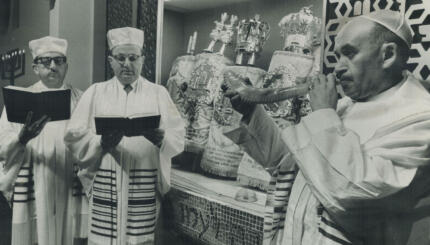We sat in synagogue most, if not all, of the day. We didn’t eat. We thought about the ways we missed the mark. We were steeped in the messages and ideas of Yom Kippur all day.
But today, we’re back at work. We’ve got e-mails to respond to, kids to drive to school and gymnastics and soccer, and are dealing with the day-to-day grind of our lives. And that’s why even though Yom Kippur is important, the day after is even more so.
Why? Because when we are all dressed up for synagogue, sitting in the sanctuary, and listening to the rabbi’s sermon, we are primed and ready to hear about compassion, or social justice, or Israel. But the challenge comes in living those ideas for the next day, the next week, the next month, the next year.
That’s why I love the book Switch: How to Change When Change is Hard. In it, brothers Chip and Dan Heath share how we can hold onto the changes we strive for. One suggestion they give is to “look for bright spots.” As they note:
Psychologists tell us that we are wired to look at the negative. One famous study concluded that, when it comes to the way we think, “bad is stronger than good.” So when it comes to changing our lives, we’ll tend to ask ourselves, “What’s the problem and how do I fix it?” But often we can benefit more by asking a different question: “What’s working and how can I do more of it?” In other words, we can learn from our own “bright spots.”
It might seem a little counterintuitive to celebrate our accomplishments on Yom Kippur, but in many ways, Yom Kippur is a celebratory day. In fact, Yom Kippur is sometimes called “Yom Ha-Kippurim” (“the Day of Atonements”), but those words can also be read as “Yom Ha-K’Purim” — “The Day Like Purim.” So rather than solely looking at the negative, perhaps we should also celebrate the ways we did become better people.
That’s why, in response to Ashamnu (“We have sinned”), the prayer recounting the ways we missed the mark, Rabbi Avi Weiss wrote Ahavnu (“We have loved”), recounting our bright spots:
We have raised up, we have shown compassion, we have acted enthusiastically,
We have been empathetic, we have cultivated truth,
We have given good advice, we have respected, we have learned, we have forgiven,
We have comforted, we have been creative, we have stirred,
We have been spiritual activists, we have been just, we have longed for Israel,
We have been merciful, we have given full effort,
We have supported, we have contributed, we have repaired.
As we move out of the ten days of repentance into the rest of our lives, of course we will have looked at the ways we missed the mark. But if we’re hoping to make change stick, what we really need to do is build on our bright spots.
May the rest of 5777 be a joyous, peaceful and good year.
Yom Kippur
Pronounced: yohm KIPP-er, also yohm kee-PORE, Origin: Hebrew, The Day of Atonement, the holiest day on the Jewish calendar and, with Rosh Hashanah, one of the High Holidays.



